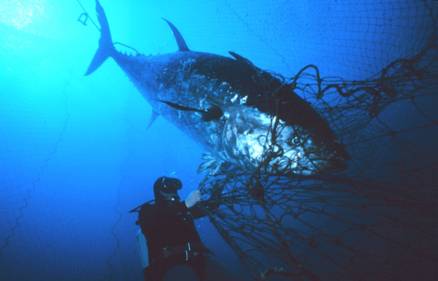
The fate of Atlantic bluefin tuna -- one of the most incredible fish in the sea, but also one of the most imperiled -- is again up for a vote.
Nations are gathering this week in Morocco to decide on how many bluefin tuna can be legally caught. Sadly, some of the most influential countries are pushing to increase catch limits on a fish that's already struggling because of overfishing.
Just like U.S. politicians who hardly have time to govern between campaigns every two years, Atlantic bluefin tuna barely have an opportunity to recover from the brink of extinction before fishing countries consider increasing catch limits.
Growing over 10 feet long and 1,400 pounds, Atlantic bluefin tuna live longer (about 30 to 40 years) and mature later (5 to 9 years) than most fish. They are amazing animals that, glimpsed in the wild, leave you in awe.
The latest review of bluefin suggests that its numbers may have increased because of lower catch limits -- but that can be deceiving. The size and speed of the fish's recovery is uncertain and many countries don't collect the data needed to accurately assess bluefin tuna's status despite the economic value having healthy stocks could bring. 
The science has been clear for years that bluefin tuna around much of the globe are being chronically overfished. And, unfortunately, every effort for additional protections since 2008 has failed, including bids for protection under the U.S. Endangered Species Act and the Convention on International Trade in Endangered Species.
Lower catch limits in recent years have helped slow the bluefin's slide toward extinction but this is no time to declare victory and ramp up fishing quotas.
If these species are ultimately going to be spared extinction in the long term, the International Commission for the Conservation of Atlantic Tuna, the group that's meeting in Morocco this week, must cap bluefin tuna fishing at current levels, or below.
At $50 per a can, bluefin isn't your everyday tuna. Unfortunately, the International Commission has been a terrible shopkeeper. Liberal controls on fishing allowed Atlantic bluefin tuna to decline over 70 percent since 1970. The last decade's rise in bluefin tuna ranches, which fatten wild juveniles until ready for harvest, further sped the decline. Even now poorly recorded bluefin tuna catches for farms and illegal fishing threaten to undermine potential recovery.
It doesn't have to be this way. Bluefin tuna can and should be saved. We're at a critical point in deciding the fate of this fish and international regulators must step up, do its duty and finally manage this fish responsibly. 
More than 40,000 people have joined the Center's bluefin boycott campaign and pledged not to eat at restaurants serving bluefin tuna; dozens of chefs and owners of seafood and sushi restaurants have pledged not to sell bluefin. For more information about the Center's campaign to save the Atlantic bluefin tuna, visit www.bluefinboycott.org.
Photo courtesy of NOAA.